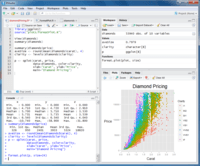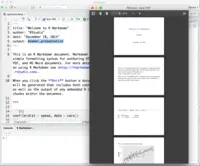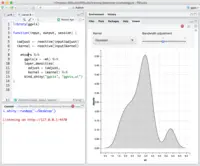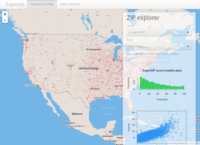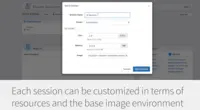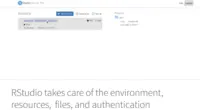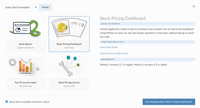Overview
What is Posit?
Posit, formerly RStudio, is a modular data science platform, combining open source and commercial products.
Posit, the Best ever Data Science Software
All-in with RStudio
Everything you need in data science
Great Product for Data Analysis
RStudio for Business Analysis
Rstudio - The most convenient ML tool
My very personal RStudio R&D journey
There is no WORK without R and no R without RStudio
RStudio Connect(s) your data science products to your clients.
RStudio is great but needs some improvements
RStudio from a Grad Student's POV
RStudio analytics perspective for product reporting
Best FOSS (Free and Open Source Software) in the market for Statistical analysis
RStudio: An all-purpose way to interact with R
Everyday Statistical Workbench
Awards
Products that are considered exceptional by their customers based on a variety of criteria win TrustRadius awards. Learn more about the types of TrustRadius awards to make the best purchase decision. More about TrustRadius Awards
Popular Features
- Visualization (26)8.484%
- Connect to Multiple Data Sources (25)8.181%
- Extend Existing Data Sources (26)7.474%
- Automatic Data Format Detection (25)6.363%
Reviewer Pros & Cons
Video Reviews
2 videos
Pricing
What is Posit?
Posit, formerly RStudio, is a modular data science platform, combining open source and commercial products.
Entry-level set up fee?
- Setup fee optional
Offerings
- Free Trial
- Free/Freemium Version
- Premium Consulting/Integration Services
Would you like us to let the vendor know that you want pricing?
11 people also want pricing
Alternatives Pricing
What is MATLAB?
MatLab is a predictive analytics and computing platform based on a proprietary programming language. MatLab is used across industry and academia.
What is Rational BI?
Rational BI provides analytics, data science and business intelligence in an analytical platform that connects to databases, data files and cloud drives including AWS and Azure data sources, enabling users to explore and visualize data. Users can build real-time notebook-style reports directly in a…
Product Demos
What is Posit Workbench? Build Data Products in R & Python using Jupyter, VSCode, and RStudio.
Posit Connect | Host all of the data products you create
Features
Platform Connectivity
Ability to connect to a wide variety of data sources
- 8.1Connect to Multiple Data Sources(25) Ratings
Ability to connect to a wide variety of data sources including data lakes or data warehouses for data ingestion
- 7.4Extend Existing Data Sources(26) Ratings
Use R or Python to create custom connectors for any APIs or databases
- 6.3Automatic Data Format Detection(25) Ratings
Automatic detection of data formats and schemas
Data Exploration
Ability to explore data and develop insights
- 8.4Visualization(26) Ratings
The product’s support and tooling for analysis and visualization of data.
- 8.3Interactive Data Analysis(23) Ratings
Ability to analyze data interactively using Python or R Notebooks
Data Preparation
Ability to prepare data for analysis
- 8.1Interactive Data Cleaning and Enrichment(23) Ratings
Access to visual processors for data wrangling
- 8.3Data Transformations(25) Ratings
Use visual tools for standard transformations
Platform Data Modeling
Building predictive data models
- 8.2Multiple Model Development Languages and Tools(21) Ratings
Access to multiple popular languages, tools, and packages such as R, Python, SAS, Jupyter, RStudio, etc.
- 8.5Single platform for multiple model development(21) Ratings
Single place to build, validate, deliver, and monitor many different models
- 8Self-Service Model Delivery(18) Ratings
Multiple model delivery modes to comply with existing workflows
Model Deployment
Tools for deploying models into production
- 8.4Flexible Model Publishing Options(17) Ratings
Publish models as REST APIs, hosted interactive web apps or as scheduled jobs for generating reports or running ETL tasks.
- 8.9Security, Governance, and Cost Controls(15) Ratings
Built-in controls to mitigate compliance and audit risk with user activity tracking
Product Details
- About
- Integrations
- Competitors
- Tech Details
- FAQs
What is Posit?
Posit, formerly RStudio, provides a modular data science platform that combines open-source and commercial products.
their open source offerings, such as the RStudio IDE, Shiny Server, rmarkdown and the many packages in the tidyverse, boast users among data scientists around the world to enhance the production and consumption of knowledge by everyone, regardless of economic means.
Their commercial software products, including Posit Workbench, Posit Connect, and Posit Package Manager, are available as a bundle in Posit Team. These products aim to give organizations the confidence to adopt R, Python and other open-source data science software at scale. This enables data science teams using R and Python to deliver interactive reports and applications to decision-makers, leverage large amounts of data, integrate with existing enterprise systems, platforms, and processes, and be compliant with security practices and standards.
The platform is complemented by online services, including Posit Cloud and shinyapps.io, to make it easier to do, teach and learn data science, and share data science insights with others, over the web.
Posit’s open-source software and commercial software form what the vendor describes as a virtuous cycle: The adoption of open-source data science software at scale in organizations creates demand for Posit’s commercial software; and the revenue from commercial software, in turn, enables deeper investment in the open-source software that benefits everyone.
Posit Features
Platform Connectivity Features
- Supported: Connect to Multiple Data Sources
- Supported: Extend Existing Data Sources
- Supported: Automatic Data Format Detection
Data Exploration Features
- Supported: Visualization
- Supported: Interactive Data Analysis
Data Preparation Features
- Supported: Interactive Data Cleaning and Enrichment
- Supported: Data Transformations
Platform Data Modeling Features
- Supported: Multiple Model Development Languages and Tools
- Supported: Single platform for multiple model development
- Supported: Self-Service Model Delivery
Model Deployment Features
- Supported: Flexible Model Publishing Options
- Supported: Security, Governance, and Cost Controls
Additional Features
- Supported: Share Data Science insights in the form of Shiny applications, Quarto content, R Markdown reports, Plumber APIs, dashboards, Jupyter Notebooks, and interactive Python content.
Posit Screenshots
Posit Videos
Posit Integrations
- Amazon SageMaker
- Kubernetes
- Apache Spark
- Jupyter Notebook
- Streamlit
- Tableau Desktop
- Azure Machine Learning
- Databricks Lakehouse Platform
- Microsoft Visual Studio Code
- Bokeh
- Slurm
- Dash applications
- SAML Marketplaces
Posit Competitors
Posit Technical Details
| Deployment Types | On-premise, Software as a Service (SaaS), Cloud, or Web-Based |
|---|---|
| Operating Systems | Windows, Linux, Mac |
| Mobile Application | No |
Frequently Asked Questions
Comparisons
Compare with
Reviews and Ratings
(237)Community Insights
- Pros
- Cons
- Recommendations
Intuitive User Interface: Users have found RStudio to have an intuitive user interface that allows them to quickly test and debug code. This has been mentioned by numerous reviewers, highlighting the ease of use and convenience it offers in coding tasks.
Seamless Integration with Git: The seamless integration of RStudio with Git has been praised by users, making it easy for them to manage version control. Several reviewers have specifically mentioned this as a major advantage of using RStudio for their coding projects.
Powerful Statistical Analysis Tool: Many users appreciate RStudio's capabilities as a powerful tool for statistical analysis and data exploration. They mention its ability to import data from multiple sources, apply machine learning models easily, and export data into various channels.
Confusing and Outdated User Interface: Several users have expressed dissatisfaction with the user interface of RStudio, finding it confusing, unattractive, and outdated compared to other tools. They feel that the interface is too technical for business people.
Frequent Crashes with Large Datasets: Some users have mentioned that RStudio frequently crashes when loading large amounts of data. This can be frustrating and disrupt their workflow.
Lack of Integration with Other Applications: Users have pointed out that RStudio is not as integrated with other applications as Python. This limitation makes it less convenient for users who rely on seamless integration between different software tools.
Users commonly recommend RStudio for beginners in R programming and data analytics. They believe that RStudio is a good tool for learning machine learning and recommend using it for data work, programming R code for machine learning, implementing R software, data analysis, and data science. Users consider RStudio to be a great resource for analyzing data and necessary for anyone who wants to get into R programming. While considering other suites and languages like Python, they still recommend taking a look at RStudio for data analysis. Additionally, users find RStudio to be useful for doing statistics and creating professional plots and figures. They suggest familiarizing oneself with common libraries in the field and doing online tutorials before starting to use RStudio. Users warn about the steep learning curve but believe it is worth investing the time to learn it. Moreover, they recommend using RStudio for big data and epidemiological research.
Attribute Ratings
Reviews
(51-75 of 122)RStudio Pro and RStudio Connect are really helpful.
- RStudio Pro is an excellent tool for data analysis in R.
- RStudio Connect is super useful to host and present the analysis report to our collaborators in our company.
- It's very straigtforward to mange the users.
- The efficiency and stability of the shiny apps on RStudio connect could be improved.
RStudio just works out of the box
- Code completion is a life saver when I vaguely know the function or variable and the popup fills in the correct choice
- Help on function definitions right in the tool; no need to search the web
- Repositioning panels on the fly allows me to minimize parts that matter and get more room for my analysis in the console or in the R file
- Built in Git helps me remember to keep the repo current
- Code formatting sometimes rearranges code that was formatted the way I wanted
- There is a bit of a learning curve setting up projects, and it makes folders even if I already had them; perhaps modal on what each choice would do might help
- We do not save environment when closing, perhaps include a one time for all checkbox
- Amazing IDE for RStudio
- Ability to publish dashboards with just a few clicks--little server knowledge needed
- A lot of the DevOps are easy to understand
- The RStudio ecosystem means we don't need a lot of other products
- Decreased speed loss when RStudio Server is connecting to a hosted drive
A scalable and robust data science lab and collaboration platform
RStudio is part of our internal data science platform and it is being used across product lines within our division (Industrial Applications).
RStudio Teams addressed the problem of having a prototyping environment for everyone. Users can decide which IDE would like (JupyterLab, RStudio, VScode) instead of forcing them to go with the default classical cloud Jupyter environment.
- Close to open source.
- Kubernetes integration.
- Run on-premises.
- Cloud agnostic.
- A bit hard to set up.
- Centralized Prototyping Environment.
- Self-service shiny deployment with minimal ops required.
- Self-service API deployment with minimal ops required.
- Matching Python and R users in the same place.
- Separation between interactive sessions and on demand jobs.
De-facto for R programming.
- Ease of integration across common programming languages
- Free tier offers much of functionalities as paid version
- Great support
- Intermittent crashing
- Improved UX for new users
RStudio has great tools for BI and Data Science Teams
- Data analysis and development of statistical / machine learning models.
- Development of information dashboards in the form of shiny applications, which are being deployed using RStudio Connect
- Provides both R and python development environments, which can be deployed to RStudio Connect
- Authentication integrated with enterprise solutions
- Well documented for end users and administrators
- Git integration for code versioning
- Project sharing is a great feature, but only works if RStudio Server is configured to use local accounts, not when using other authentication methods
light user
- Data manipulation, easy and handy.
- Exploratory analysis, nice plots.
- Simple stats analysis, t test.
- Output format, it could be better so we can easily add output to a doc/ppt for sharing.
- Error message, it could be more informative.
- Data processing, it gets slow when data is big (e.g. millions of rows).
RStudio free IDE data analysis to AI
It is used across whole organization.
Developing Machine Learning Analysis on predicting/ identify cases from the free text fields. Performing Natural Language Processing and other AI analysis!
- The tool provides vie of Code, log, data and library , plots on same places!
- Lots of predestined code , projects and samples available to ready to use with little modifications!
- Lots of Machine Learning algorithms, Artificial Intelligence related samples, and projects available.
- RShiny is great tool to develop a web applications and data visualization.
- Free of cost tool, easy to install and manage libraries. Does not take too much expertise to install or maintain RStudio tool!
- The dropdown menus or tool in order to test or select some of basic Machine Learning algorithms for analysis. Which requires No to very little coding.
- Some ready to use tool or menus in order to create different types of charts, GIS maps or other data visualization like MS Excel!
The tool provides the cloud connection and easy to share projects between team members.
The RShiny is great tool on development of web applications and data Visualization!
The Machine Learning algorithms are easily accessible and designed on normal computer!
It will be great if users are able to select RAM size or GPU for advanced machine learning projects.
Best way to do R and much more!
- Great autocompletion
- Easy debug mode
- Useful Markdown templates
- Auto alignment
- Suggestions pop up for clean coding style
- Improvements in document outlining
Software that adds value to any data platform.
- R Studio is particularly good at performing quality assurance checks on data sets.
- R Studio is better than some other software at allowing the user to quickly test the data for coding errors.
- R Studio allows the user to reduce the number of lines of code to perform functions.
- More support for packages.
- Faster loading times.
- No suggestions.
RStudio - Best data science and machine learning tool
- Reticulate package makes python developers life easy and adds more options for resolving an issue.
- Shiny and Markdown applications provides rich visual for business.
- Professional version has easy driver installation/upgrade modules.
- RStudio is one of the best GUI in market.
- Better Usage Tracking for all activities that are performed in both RStudio Server and Connect.
- Better alert mechanism for anomaly in resource usage.
- Better query governance with GUI.
Good experience with RStudio, hoping it evolves faster
- Easier loading of packages without needing to search depositories.
- Neat layout when graph is being ouput.
- Pathway management is messy.
RStudio is the leading IDE for R
- Interactive usage
- Good community support
- Active development
- Better documentation on new offerings
- Better debugging of community offerings
- Less closed ecosystem
RStudio is a great end user product
- R Shiny Apps - Great solution for fast prototyping
- Flask or Plumber - can implement an api very quickly
- Jupyter notebook or R Markdown doc - great for a dynamic report that you want to have refresh periodically
RStudio for life sciences data science
- Interactive programming environment in R
- Controlled package environment with docker containers
- Management of users with authentication
- Management of user sessions with clear options and flexibility
- Management of docker containers for programming environments (ease of use)
- Process of deploying dashboards to RStudio Connect (specifically package versioning and management using packrat and RStudio Package Manager is difficult)
- Occasional lags and bugs in spinning up sessions or working interactively
The tools are not really developed to be seamless for controlling the R environment or doing "production" or highly reproducible analysis.
A must-have expansion to R core!
- Deploying known processes already built in R.
- Easily producing UI's for triggering known processes in R or SQL.
- Creating dashboards.
- Creating landing pages / managing the environment as a whole.
- Monitoring app usage.
Reflection of being a three-years RStudio user.
- Reproducibility for repetitive reports.
- Endless choices of open source packages supporting integration with data lake and data warehouse.
- Flexibility of customise visualisation.
- Python is quite popular in the industry, though the package rticulate is available to support integration, there is still room to improve.
- Environment management (package and R versions) is complex, or need to purchase paid functionality on Mac.
The vice-chancellor is asking for updates of how the student admission pipeline looks. This will be enabled by RStudio where daily patterns can be reproduced by day, and supporting defects identification and etc.
Less appropriate:
- Hosting data collection: for example, collecting individual students information and insert into the database, or
- Manipulating database structure: for example, dropping a table or merge tables to be stored in the database.
RStudio helps reluctant researchers with its intuitive IDE
- Script-driven research which allows for provenance and reproducibility.
- Intuitive IDE that is constantly improving.
- Tight integration with git / GitHub.
- Tighter integration to other proprietary tools such as REDCap, SAS, SPSS.
- More point-and-click to code tools for reluctant coders.
RStudio is a world of possibilities
So far have been addressing several business problems concerning HR analytics, sales optimization, stock optimization, database automatic consolidation, utility expenditure forecast. Many other projects are ongoing exploiting the APIs provided by the platform
- Easy to use. Not only for power user but also for people who need a reliable platform to deliver contents.
- Very versatile. There are many tools that can serve the scope of communicating results.
- Constant updates and newsletter keeps you on the track.
- Management of some deeper aspects of the platform is not a so straight-forward, especially when it comes to deal to customization (connections, packages management...).
- Administration console may be a bit richer, making available of some operations that you may be interested on doing by user interface and not by shell.
- Deploying apps is still a bit problematic for some particular (rare!) packages, make it easier to install packages not from the CRAN.
On the other hand, when it comes to structuring a more complex architecture in which RStudio Connect is only a part of it, it becomes more complicated. Of course we must say that we have received a lot of support in doing that!
Sysadmin's review
- RStudio staff is very knowledgeable and supportive.
- The product documentation compared to other products we use is very good.
- Product roadmap is interesting and suits our future needs.
- For me the RStudio Launcher documentation (slurm/kubernetes) is not as clear as the rest. I had to put serious effort and a lot of trial and error to get all parts working.
- Admin web interface should provide clusterwide information - not per server.
- Developers are struggling to find a good way of working with tools like plumber & postman (web api) that start a locale service within RStudio server.
- Similar while switching from local IDE to RStudio Server Pro some developers ran into issues using oauth authentication flows.
- Integration with slurm, ability to run jobs that could not be run on a local workstation/laptop.
- Not have to troubleshoot local installations (dependency issues), sort out once on a central installation.
- Integration with external authentication.
- HA setup.
Less appropriate:
- Less suited for developers who are used to have full freedom to do whatever they want on their workstation.
Build and Share Data Science Products with RStudio
- Brilliant IDE for coding.
- Easy publishing of apps and documents.
- Ease of use for data engineering team.
- It's consistently growing Python support, but there is still some room to grow here to make it a truly bilingual platform for data science. That said, it does server our Python users fairly well, even in its current form.
RStudio suite is amazing!
- Keeping things simple and tidy.
- Integration of different languages (R, Pytho, Bash, SQL).
- Testing code directly in the same IDE.
- Shiny apps deployment to RStudio connect may be tricky with repositories that are not CRAN (e.g. Bioconductor).
Amazing open source tools
- Data wrangling
- See the data and the environment in IDE
- Rmarkdown output in many forms
- Readable code
- Addins
- Rainbow parentheses
- Encourages open community & diversity
- Fun conference
- Segregation between high end and open source
- Need a clear Shimano-Style trickle down timeline of technology - so that what is available for Pro premium now should be in the open source version in N (5? 10?) years.
- Help teach new, diverse community to become coders and package-makers - pretty good now, but still fairly jargon-y and a steep learning curve. More resources to reach more people & move them from Excel to reproducible research.
- Make writing functions in the tidyverse cleaner and easier. Tidyeval is still a bit of a mess. Much better with curly-curly, but still many exceptions. still a ways to go.
- Ggvis is a neglected appendage. Should it be retired? is there a newer, better framework for interactive plots that can be used?
- Embrace open source package developers who do great stuff, like flextable. Too often RStudio uses its bully pulpit to overrun existing packages (patchwork > cowplot, gt > flextable). Embrace these folks and bring them into the fold (well done with Claus Wilke. Would like to see something like that with David Gohel.
- Would like to see a semi-automated workflow to take a dataset and generate oxygen documentation for each variable.
Not great (lots of barriers to entry) for Excel users. They can "code" - lots of complex formulas. But lots of entry processes are not great. Just installing Rstudio has ~14 screens of yes/no/default clicks. Better to have an option for "just give me the standard install" with a lot fewer clicks.
RSC review
- Easy to deploy and share with other teams.
- RStudio support.
- Ability to incorporate open source tools.
- Ability to scale across the company is limited based on the users license, cannot share a dashboard to the general view of the company.
- Ability to retain session - not simple method to customize view per user (e.g., once session is ended, the users will return next time to the baseline view).
- Ability to enable communication between multiple users - leave notes, tag other users, or share specific view.
I see the limitation of RSC when needed to scale it. The requirement for the each viewer to have RSC user license, limit our ability to scale our team deliveries across the company.
- Great IDE
- Multiple language support
- Github integration
- Shiny integration
- Python integration
- C and C++ integration
- Project tools
- Graphics
- Integrated debugging tools
- Multiple versions of R can be confusing to maneuver
- Quick view of library locations relevant to the R version in use would be a good resource and reduce confusion
- Better online publication options for quick release, small apps by students
- Big data model generation
- Financial time-series applications
- Hybrid R/Python development
- Cluster analysis
- AWS cloud
- Rapid prototyping/rapid development
- New analysis tool development and distribution


